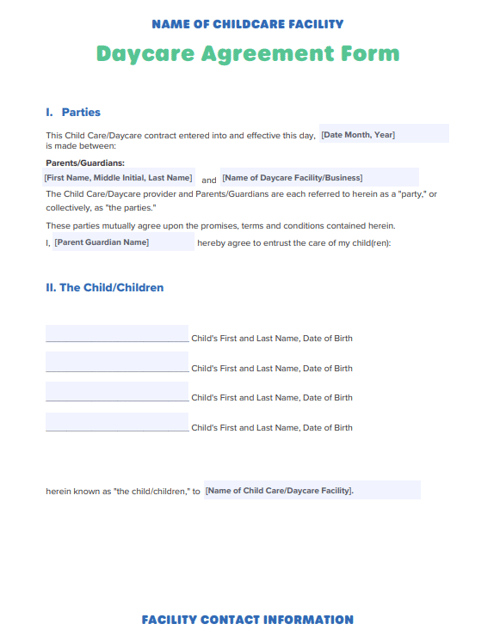A daycare contract is an important agreement between you and the families whose children attend your center. To operate a thriving daycare center, it's critical to establish a warm yet professional relationship with the parents of the children in your care. Sometimes it's challenging to balance being a high-quality care provider and a focused business manager.
If you struggle to discuss topics such as payment, rules, and expectations with your clients, you're not alone. A daycare contract can help!
If you've never used one before, this article will show you what should be in every childcare contract and how to write a daycare contract. Seasoned daycare managers who want a refresher on contracts should also find some helpful tips here. We also include a free daycare contract template to help you get started.
Table of Contents
- Why Daycare Contracts Are Essential
- What to Include in a Daycare Contract
- What Should Not Be Included in the Contract
- What to Do When Contract Terms Change
- Additional Contract Clauses
- Ideal Contract Length
- Digital Contracts
- How to Write a Childcare Contract
- Pitfalls to Avoid When Writing Daycare Contracts
- What Happens When You Do Not Enforce Contract Terms?
- How to Inspire Clients to Read the Contract
- Do You Need a Lawyer to Write a Daycare Contract?
- Free Daycare Contract Template for Childcare Centers
Why Daycare Contracts Are Essential
New daycare owners typically strive to start their businesses on the right foot, which can mean purchasing all new supplies. They spend time planning what the environment will feel like, including paint colors. Don't forget the countless hours spent recruiting the new daycare staff. While all of these things (and more) are important when starting a daycare business, be careful not to forget about another essential component of a successful business — the daycare contract. There are several benefits to having a contract, but they serve two primary purposes for your business: clarity and protection. One mistake some daycare owners make is thinking that creating written policies is sufficient. Policies provide details. Contracts are legally binding agreements that protect both your business and your clients. Without a well-designed contract, you put your daycare center at risk for lawsuits and other problems.
What to Include in a Daycare Contract
All daycare contracts should include a few specific clauses. Once you meet those requirements, you can pick and choose what other rules you want to have. The daycare center contract must-haves include the following:
- Names of all parties
- Terms of the contract
- How to terminate the contract
- Signatures of all parties
We'll expand on these four clauses over the following few sections, but there are two other clauses you should consider including in any daycare contract. All contracts should include your fees. As an added layer of protection, a savvy daycare owner will include the expectation that clients will pay a minimum of one week in advance. They will also pay in advance for the final two weeks you care for their child. This helps protect you from a parent leaving your program without paying all fees owed.
Now, let's break down the different parts of a standard daycare contract.
Identifying Information to Include in a Childcare Contract
Your business contract needs to include several pieces of identifying information, starting with names. Make sure to include the following:
- Your business’s name
- Your first and last name
- Parents' first and last name(s)
- Children’s name(s)
You need to include your business name and physical address. If your center has a website or email address, you can also put that information in the contract.
Daycare Contract Terms
Daycare managers use contracts to set expectations. They do so through the terms of the agreement. When writing daycare contracts, be aware that not all rules included in a contract are legally enforceable if you are involved in a lawsuit. Some daycare managers put policies in the contract and end up with too much content that isn't necessarily relevant to the contract. The two rules you can enforce are those that deal with payment terms and service hours.
Payment Terms Must Be Clear
Payments can be a sensitive subject for clients, particularly because around 72% of daycare clients say they spend 10% or more of their income on childcare.
Regarding payment terms, you need to tell clients when payment is due. If you decide to require a deposit, include that information under the payment terms section.
Here are the payment details a childcare contract should include:
- Inform parents about your rates. You should break down rates by weekly, daily and drop-in (if applicable).
- Include your payment terms. Parents need to know if you accept cash, checks, money orders, credit or debit cards or other payment methods.
- Contracts should include details about payment due dates. For example, do you expect payment on the first day of the month, or do you give clients 1-4 days to pay? If you offer drop-in childcare, do you require payment at drop-off or pickup?
- Your contract should also outline what happens when a client is late with a payment. If you charge late fees or offer a grace period, include that in the contract.
- Contracts should also define what happens if the client leaves your program without paying. Include the deposit terms in the agreement if you require deposits.
Additional Payment Details to Include in a Contract
Some daycare centers charge an enrollment fee. Others charge a supply fee. Be sure to write both into the contract. If you hold field trips or other events that you expect clients to pay for, ensure that a clause in the contract lets parents know to expect additional fees for future activities. If you charge for holidays and vacations, you must include the information in the contract. Also include those details if you require the client to pay when they're on vacation or the child is absent from care.
Next, let's look at the other legally enforceable contract component service hours.
Hours of Operation and Your Childcare Contract
The daycare center’s service hours often cause parents confusion and worry. They worry you won't open early enough for them to get to work on time. They worry that they won't arrive in time to pick their child up before you close. Your contract should clearly indicate your hours and days of operation. Having this information in your contract protects your business and your clients. For example, if a client refuses to pay for care on a day when your center is open, a court of law will enforce this rule. Likewise, if a childcare provider refuses to provide care on a day included in the contract, the client isn't legally required to pay for that time.
Inform Clients How to Terminate the Contract
While no daycare manager wants to terminate a relationship with a client, sometimes it's necessary. When it happens, all parties to the contract should have a clear path to termination. There should be two sets of rules for termination: one for the client and one for the provider. Most daycare providers require clients to submit written notice of termination. Usually, they ask for a minimum of two weeks' notice. The provider's should be able to terminate the contract at will. This allows the provider to end a contract immediately if a client becomes disruptive to the operation of the daycare center.
All Signatures Required
To be enforceable, contracts require signatures. Many people take the power of a signature for granted. When a person signs a contract, it means they've read the agreement and agree to the terms and conditions. It also means the signer intentionally enters into the agreement. Finally, a signature indicates the signer is authorized and competent to sign the contract.
Speaking of signatures, if you offer your clients a digital contract, signing the contract online is as binding as signing in person.
What Should Not Be Included in the Contract
You don't need to include every detail of your daily operations in a daycare contract. While you want to make clients fully aware of your policies, they don't belong in a contract.
Policies include things such as:
- Illness and emergency
- Meals
- Activities
- Naps
- Discipline
- Toilet training
Most daycare providers also have policies on who is authorized to pick up children.
What to Do When Contract Terms Change
From time to time, a daycare manager may make changes to operations that change the terms of the daycare contract. The best way to manage changes without causing contract issues is to create addendums when you make those types of changes. For example, if you change your daycare payment methods to no longer include credit or debit card payments, you must write the change into the existing contract. In another example, if you change your hours of operation, you must modify your contract to reflect the change. Essentially, any change to your payment system or days of operation must be updated in the contract. Once you update the childcare contract terms, all parties must sign so the new contract is enforceable. Everyone who signs should receive copies of the daycare contract. The daycare center manager keeps originals and makes copies for the client.
Clauses to Think About Adding to the Contract
Additional clauses you may want to include in your daycare contract include the following.
Medication Clause
Inevitably, you will have children that require medication while in your care. It would be best if you considered including a clause indicating whether you accept the responsibility of administering medication for a specific child. This clause should also clarify your role as a childcare provider. A medication clause in the contract protects you and the child.
Notification Clause
You can also include a clause in your contract that clarifies how you and your client will provide notice regarding absences, scheduled vacations, or late pickup.
Contract Deadline
We've talked about making adjustments to daycare contracts and communicating those changes to clients. It's a good idea to include a contract acceptance deadline. This ensures everyone has time to review the contract and have any questions answered before signing. Adding any of these clauses can help prevent misunderstandings in the future.
How Long Should a Contract Be?
If you've ever made a significant purchase like a house or car, you likely signed a tall pile of documents — your sales contract! Many contracts are filled with legalese, making them nearly impossible to understand. Some contracts include way too long for the average person to read and comprehend.
Here are a few things to remember regarding length:
- The way you word the contract's content is more critical than length.
- Make statements short.
- If the content isn't easy to read, your clients may not read it all the way through.
- There's nothing wrong with a one-page contract if it includes everything needed to make it legally binding.
What Clients Should Know When They Sign a Daycare Contract
When you present your daycare contract to clients, it's vital that they read and agree to the contract terms. By signing the contract, the client indicates that they understand your rates and payments, including any extra fees. Their signature also means they understand when you're open for business and what happens if they're late picking up their child. The contract protects the client just as much as it's designed to protect the daycare business. That means the client is just as accountable as the daycare manager to uphold the terms.
Are Digital Contracts Legally Binding?
Earlier, we mentioned offering clients digital contracts. People often wonder if a digital contract is legally binding. The Electronic Signatures in the Global and International Commerce Act (ESIGN Act) and the Uniform Electronic Transactions Act (UETA) stipulate that electronic signatures are valid. They're just like signing your name on paper. You should be able to use contract management software to set up electronic signatures on the digital contracts you provide to your daycare clients.
How to Write a Daycare Contract
The format of a contract isn't what makes it legally binding. It's the content. You can start from scratch and write your own contract, or you can use a contract template. A template may be a good investment if you purchase a template from a reliable source that includes everything you need to enforce the contract. Templates save time because all you need to do is fill in the blanks with your information. Templates are also easy to edit when it's time to update your contract.
Pitfalls to Avoid When Writing Daycare Contracts
If you're managing a daycare center, having a clear and concise contract in place goes a long way toward creating a positive and professional relationship between you and your clients. To make your childcare contract as successful as possible, there are some mistakes to avoid. Potential pitfalls include a lack of clarity on the following topics:
Care Hours and Fees
Some clients will assume that if they pick up their child early, the child arrives late or the child misses a day, they can pay a reduced fee. If the client signed a contract for full-time care, they must pay the full-time fee. Exceptions to this clause can be built into the contract if you choose to do so.
Absences
Children may miss daycare days for a range of reasons. They get sick or develop fevers, take family vacations and have doctor and dentist appointments. Your contract must clearly explain how clients should notify the center of the child's absence. The contract should also indicate whether or not you adjust the fees when there's an absence.
Rate Increases
Daycare rate increases aren't usually comfortable conversations. If you include language in your contract that lets clients know you increase rates regularly each year, it eliminates an unpleasant surprise. Include this information in the payment clause.
Late Payment and Nonpayment Fees
Make sure to include language that clearly puts the responsibility for fees incurred due to returned or nonpayment of checks solely on the client. If you require clients to pay those costs within a specific time-frame, include that as well.
One More Word of Caution
Daycare managers are free to write their childcare contracts in a way that fits their business and client needs. However, there may be rules you need to follow. Each state has licensing rules for daycare providers. Your state may require specific provisions for your contract. Check your licensing documents before you finalize the contract you give to clients. It's also a good idea to familiarize yourself with federal anti-discrimination laws. These laws make it illegal for childcare providers to discriminate based on race, gender, age, disability, religion or national origin in their written contracts. Your local and state governments may have additional rules regarding contract language in the area of discrimination.
Can You Offer Flexibility?
There will likely be times when you offer a client a bit of flexibility. You may waive the late fee or make an occasional exception to a rule written in the contract. When you're managing a daycare center, flexibility can be a positive thing that helps clients when they get in a bind with their schedules or finances. Flexibility may help you retain good clients. Unfortunately, some daycare managers put rules in contracts that never get enforced. This creates confusion for both clients and daycare staff. If you foresee a clause in your contract causing trouble, it's better to either rewrite it or eliminate it. Your clients will appreciate consistency and clarity over confusion.
What Happens When You Do Not Enforce Contract Terms?
The flexibility discussed above may help a client when they really need it, but not enforcing the terms of a contract can backfire. You can minimize problems if you include the correct wording in the contract. Include a statement that your failure to enforce any contract term does not invalidate that term. This language frees you to make exceptions but maintain your right to enforce the contract terms in the future.
How to Inspire Clients to Read the Contract
Do you tend to skim documents? So do your clients, even short documents. This is probably why daycare managers have difficulty getting all their clients to read their daycare contracts. No one has time to read all the fine print, especially when much of it sounds like a foreign language with many unfamiliar legal terms. If your clients aren't reading the contract in its entirety, they will likely miss critical points. You can't force them to read, but there are some ideas to consider to help remind them of the information in the contract:
Addendums
When you create an addendum to a contract, you can make it a separate form. Let's say you're experiencing an issue with parents not respecting operating hours. Create an addendum. Put a big heading on it to call attention to the information. List your operating hours on the form. You may still have parents who don't read or forget that specific rules are in the contract. But at least you have a separate form to refer parents to when they become confused.
Send Reminders
Everyone has a lot going on these days and almost too much to remember. You can help your clients by sending reminders. For example, if you collect fees on Mondays, send a reminder home with children on Fridays. You can also use a system of daily notes, texts and emails for reminders. If you have clients who seem to forget essential rules like payment rules, these ideas may help.
Do You Need a Lawyer to Write a Daycare Contract?
If you've decided to use a template or write your contract from scratch, a lawyer can review the document to ensure you've covered the local and federal legal requirements for a daycare center. Of course, you can hire a lawyer to write the contract for you, but that will increase the cost significantly. Below you’ll find a sample child care agreement form to help you get started.
Free Daycare Contract Template for Childcare Centers
Do you need a daycare contract template? We've got you covered with this free child care agreement form that you can use for any standard daycare contract. Use this child care form in its entirety or as a daycare contract template that you can edit to suit your own daycare contract needs. You can copy and paste the text below in your own document or you can download the editable PDF and Word templates:
Download Now!

Child Care/Daycare Contract
- Parties
This Child Care/Daycare contract entered into and effective this day, [Date and Month], 20[Year] is made between:
Parents/Guardians: [First Name, Middle Initial, Last Name], and [Name of Daycare Facility/Business].
The Child Care/Daycare provider and Parents/Guardians are each referred to herein as a "party," or collectively, as "the parties."
These parties mutually agree upon the promises, terms and conditions contained herein.
I, [Parent/Guardian Name], hereby agree to entrust the care of my child(ren):
- The Child/Children:
____________________________ Child's First and Last Name, Date of Birth
____________________________ Child's First and Last Name, Date of Birth
____________________________ Child's First and Last Name, Date of Birth
____________________________ Child's First and Last Name, Date of Birth
herein known as "the child/children," to [Name of Child Care/Daycare Facility].
- Schedule: The terms of this agreement shall commence on [Start Date of Child Care Services], 20[Year], and end as of: (mark one)
__ At will with written notification at least ___ days in advance.
__On the date of __________, 20__.
Services will be provided during the following times:
Arrival time a.m.: _____ Pickup time p.m.: _____ on each of the following days:
[List all days of child care services needed]_____________________.
These dates (select one) are/are not flexible.
- Child Care Services: The Child Care/Daycare agrees to provide the following needed care to the child(ren). Such care will include, but will not be limited to, encouraging good behavior, constant live adult supervision, age-appropriate instruction, encouraging participation in social activities, and each of the following additional services: (mark all that apply)
__ Providing meals/snacks
__Changing diapers/assisting in bathroom breaks
__Other: ______________________________________________________.
These services will be hereinafter known as "child care services."
- Payments: Payment for said child care services will be $_______ per week/day/hour.
A late pickup fee of $___ will be charged for every ___ minutes beyond the agreed-upon pickup time.
Payment is due to the Child Care/Daycare provider by the ____ day of the month preceding child care services. Accepted methods of payment include cash, personal check, credit card, or money order.
(a). Late payments. If a personal check is returned due to a lack of personal funds, a fee of $____ will be charged for each day past the payment's initial due date. If a personal check is returned more than once, only cash or money orders will then be accepted for payment.
(b). Late pickup fee. Parents/Guardians must contact the Child Care/Daycare Provider if they will be late picking up a child(ren). The Parent/Guardian will be charged a late pickup fee of $____ for every ____ minutes they are late past the agreed-upon pickup time.
(c). Overtime payments. If the parties agree upon overtime hours of child care services for the child(ren), said overtime care will be provided at the rate of $____ per hour, per child.
If overtime care is provided by the Child Care/Daycare provider without prior approval between the two parties, the Child Care/Daycare provider will provide overtime care at the rate of $____ per hour, per child.
(d). Additional fees. The provider will charge additional fees for the following: ____(i.e., for supplies, field trips, special events, etc.) _____________________________.
- Security Deposit: Parent/Guardian: (check one)
__Is Required to pay a security deposit in the amount of $_____ to the Child Care/Daycare provider that may be applied to damages made on the premises by the child, or for unpaid balances by the parent/guardian. If this security deposit is used by the Child Care/Daycare provider, the amount used must be repaid or this Agreement will be terminated within 5 business days. If the security deposit is not used by the Child Care/Daycare provider within the agreed-upon time of services, the security deposit will be returned to the parent/guardian, in full, at the end of the agreed services.
__Is Not Required to pay a security deposit before the Child Care/Daycare services can begin.
- Holidays. The parties acknowledge, and agree, that child care services will not be provided on any of the following days: (check all that apply)
__New Year's Day
__Martin Luther King Jr. Day
__President's Day
__Memorial Day
__Independence Day
__Labor Day
__Columbus Day
__Veteran's Day
__Thanksgiving Day
__Christmas Day
The Parent/Guardian will not be responsible for payments on any of these days.
- Vacation/Absences. The following vacation times will be allowed for each party: (check all that apply)
__Parent/Guardian Vacation. The parent/guardian must provide at least ___day(s) notice prior to their child(ren) being removed for vacation time. The Parent/Guardian __is or __is not required to pay for services during vacation time.
__Child Care/Daycare Provider Vacation. The Child Care/Daycare provider must provide the parent/guardian with at least ___ day(s) notice prior to taking time off for vacation.
The parent/guardian must notify the Child Care/Daycare provider of any unplanned absences within 3 business days following the absence. Parents/guardians must notify the Child Care/Daycare provider of planned absences at least ___day(s) before the absence.
If a child(ren) is absent without proper notice, within 3 business days, of said absence, the parent/guardian will be charged ________ for the unexcused absent day(s).
- Damages. If any of the child(ren), while receiving child care services under the charge of the Child Care/Daycare Provider, causes any damages to property beyond the normal wear on toys/furniture, the parent/guardian will be responsible for repairing said damages caused by the child(ren). The cost for damages will be taken first from the security deposit, if applicable.
- Governing Law. This Agreement will be governed by and construed in accordance with the laws of the State of ________.
- Severability. If any condition, term, or provision of this Agreement is held by a court of competent jurisdiction to be invalid, unenforceable, or void, the remainder of the provisions shall remain in full force. They shall in no way be impaired or invalidated.
- Termination of Contract. This Agreement may be terminated by either party. ___ week(s) must be provided by the terminating party prior to the last date care is to be provided.
The Child Care/Daycare Provider may immediately terminate this Agreement at any time if payment is not made on time. If the Child Care/Daycare Provider chooses not to enforce any portion of this contract, it does not forfeit the provider's right to enforce any other portion of this Agreement.
This Agreement can be revised at any time by the Child Care/Daycare Provider.
- Entire Agreement. This Contract constitutes the entire Agreement between the Parties to its subject matter and supersedes all prior contemporaneous representations, contracts, and understandings of the Parties. No alterations, supplements, or other amendments may be made to this Agreement unless executed in writing by both parties.
Parent/Guardian Signature: ______________________________________
Date Signed: _________________________
Printed Name: _____________________________________
Child Care/Daycare Provider Signature: ______________________________________
Date Signed: _________________________
Printed Name: _____________________________________
Get 70+ Editable Daycare Templates for Almost Every Situation
 We know daycare providers like yourself are busy. That's why we made dozens of templates to help you manage the various aspects of your organization. From billing and invoicing to marketing materials, we have it all. Download all 70 today!
We know daycare providers like yourself are busy. That's why we made dozens of templates to help you manage the various aspects of your organization. From billing and invoicing to marketing materials, we have it all. Download all 70 today!











